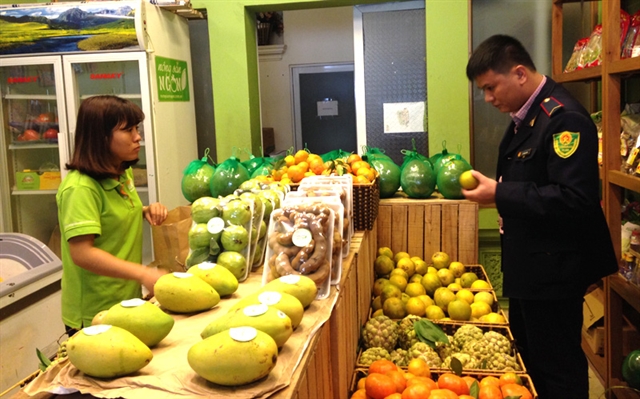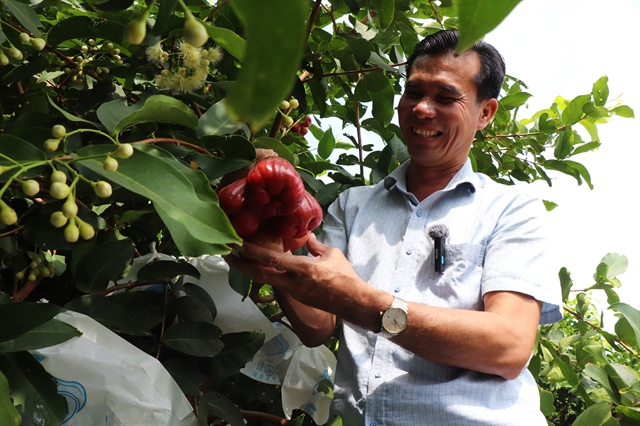 Society
Society


|
| An inspector checks the quality of fruits at a store in Hà Nội’s Hà Đông District. Photo hanoimoi.vn |
Tố Như
HÀ NỘI A pilot project to enhance the management of fresh fruit stores in Hà Nội has improved consumer awareness of food safety, but sellers' adherence to food safety regulations remains a problem.
Trần Thị Phương Lan, deputy director of Hà Nội Department of Industry and Trade (DoIT), said developing a civilised and modern market was an initiative of the city authority to boost the awareness and responsibility of sellers and citizens in ensuring food safety.
According to DoIT, there are 798 fruits shops in the capital's 12 urban districts. Of these, 780 have met standards as of the end of July.
The department has organised training for officials in charge of food safety management and fruit stores in these districts. It has also worked with food preservation equipment providers - Sanaky and Alaska – that agreed to sell their products to fruit shop owners in the city for 10-15 per cent lower than market price.
Nguyễn Mạnh Hà, vice chairman of Long Biên District People’s Committee, said positive changes have been made over the past year in his district.
“Ninety per cent of fruit stores have shelves and all businesses selling ready-cooked food have cabinets to store food,” he said, adding that all stores have signed a food safety commitment.
Trần Thị Hiền, a fruit seller in Long Biên District’s Ngọc Lâm Market, said since the market’s management board promoted a programme on "civilised trade", she has realised her duty is to follow the regulations.
“I’ve committed myself to fight trade fraud. The price of each kind of fruit must be publicised.
"I promise to treat customers friendly and with the most hospitality,” she told Việt Nam News.
While efforts to improve the food service have had success, experts said challenges remain.
The quantity of fruits supplied from Hà Nội is only 30 per cent while 70 per cent is imported from other provinces and cities. Thus, it was difficult for many wholesalers to provide bills of sale to prove where the food comes from.
Many consumers don’t pay attention to product origin and buy fruit in places convenient for them, allowing the existence of fruit street vendors.
Some market management boards failed to fulfil their duties so substandard food still existed in some places.
Solutions
To ensure the effectiveness of the initiative, Lan said the DoIT would work with relevant units to deal with street vendors.
The department has been drafting a project to supply safe fruits to local consumers, she said.
Lê Hồng Thăng, director of Hà Nội Department of Industry and Trade, said the project would soon be expanded to all fruit shops in the capital city including those at wholesale markets. Awareness campaigns will also be strengthened to spread knowledge about the project’s objective as well as regulations on the trade of fruits.
The department plans tp collaborate with districts’ People’s Committee in advising fruit stores to complete procedures to receive project signboards, he said.
Thăng said during the project’s implementation, the Hà Nội Department of Agriculture and Rural Development has worked with the association of small and medium-size enterprises to apply QR codes for tracing the origin of agricultural products in the city.
“So far, 80.5 per cent of the city’s fruit stores use QR codes,” he said.
Chu Phú Mỹ, director of Hà Nội Department of Agriculture and Rural Development, said the department would continue working with other provinces and cities in exchanging information relating to food safety, supervising and advertising their safe food in Hà Nội.
Relevant departments were asked to submit recommendations to the municipal authority regarding the establishment of a special zone dedicated to the sale of safe agricultural products with clear origin at traditional and wholesale markets, he said. — VNS




